Tuesday, June 4th, 2013
By Carolyn Yeager
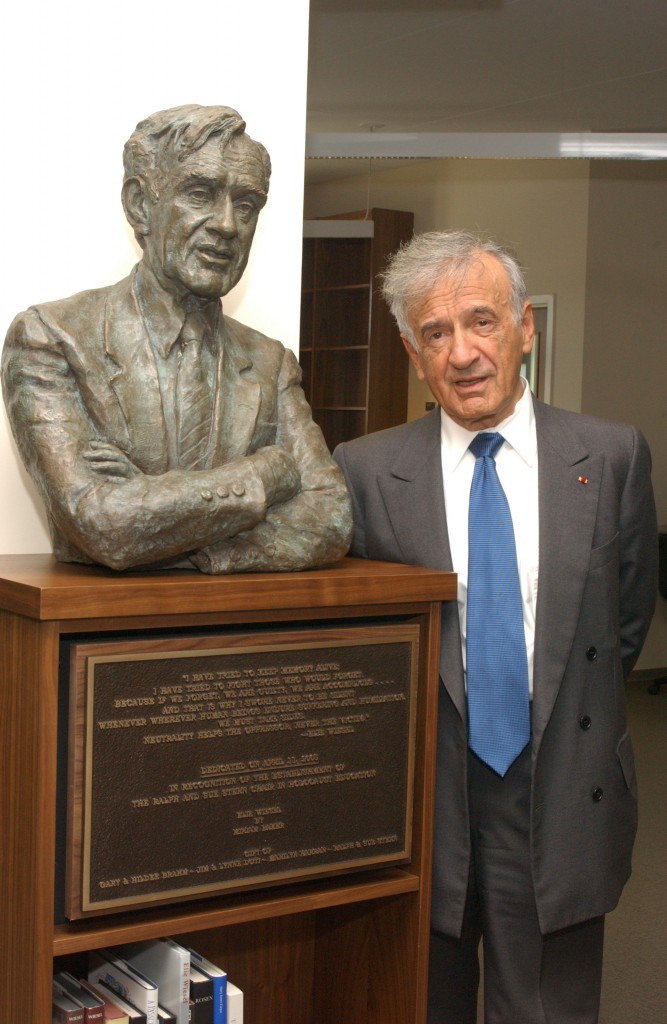 Elie Wiesel did not have a visit with Chapman University students this spring. Up until this year, he had completed only two years of his five-year appointment as a Distinguished Presidential Fellow at the university. 2013 would have been year three. Wiesel previously arrived at the end of March or in April for about five days. Now it is already June and school is out.
Elie Wiesel did not have a visit with Chapman University students this spring. Up until this year, he had completed only two years of his five-year appointment as a Distinguished Presidential Fellow at the university. 2013 would have been year three. Wiesel previously arrived at the end of March or in April for about five days. Now it is already June and school is out.
I searched the March 2013 archives of The Panther, Chapman U’s student-run newspaper, and found nothing. It always covered Wiesel’s visits in the past.
The last public appearances that I know of are his speech at Kent State University in Ohio on April 11th, and his participation in the U.S. Holocaust Memorial Museum (USHMM) 20th anniversary on April 28-29, during which he had to meet lots of people. He looked frail at both events and I imagine he didn’t think he had the energy for more than those.
I have a suspicious thought, however, that he simply ran out of anything of even pretend-value to say to young students, and is now begging off his 5-year appointment. I think at the time, shortly after the Bernard Madoff scandal broke, Wiesel felt he needed money and the California Jewish funders of Chapman University’s holohoax wing came up with this idea. Wiesel grabbed it, but now doesn’t care as much, being that his son is a Vice-President at Goldman Sachs. He’s probably made up his losses already.
Wiesel had heart by-pass surgery last year, about which he wrote a book, naturally. So though he shouldn’t be having heart trouble, we may be seeing quite a bit less of him from now on. At 84, he needs to conserve his energy.
Pictured right: Elie Wiesel in younger days poses with a large bronze bust of himself that adorns the entrance to the Sala and Aron Samueli Holocaust Memorial Library at Chapman University. It opened in April 2005 and is like a little holocaust museum right there on university grounds.
* * *
I have updated the Page titled “Famous Photo of Buchenwald Survivors”, which is accessed under “The Evidence” > “Photographic Evidence” on the upper menu bar. I hope you will take a look at it. I’ve added quite a bit to what was there, and also removed some things that I no longer agree with.
This photograph is an amazing study in the use of photo-montage and general photo-manipulation by the U.S. Army OSS, and the false claims by “survivors” to be in the picture. In many cases, it seems to be mainly ego-gratification–to claim to be in an iconic image representing an important historic time of one’s people. But there is also in some cases a desire to add one’s own “witness” to the false ideas attributed to Buchenwald–a climbing on, so to speak. Such a willingness to bald-face lie is hard for non-Jewish people to fathom.
No Comments
Category Featured | Tags: Tags: Bernard Madoff, Chapman University, Distinguished Presidential Fellow, Elie Wiesel, Famous Photo of Buchenwald Survivors, Goldman Sachs,
Social Networks: Facebook, Twitter, Google Bookmarks, del.icio.us, StumbleUpon, Digg, Reddit, Posterous.
Monday, April 4th, 2011
By Carolyn Yeager
Cliches are all Chapman students get from the Master of Platitudes’much-ballyhooed visit.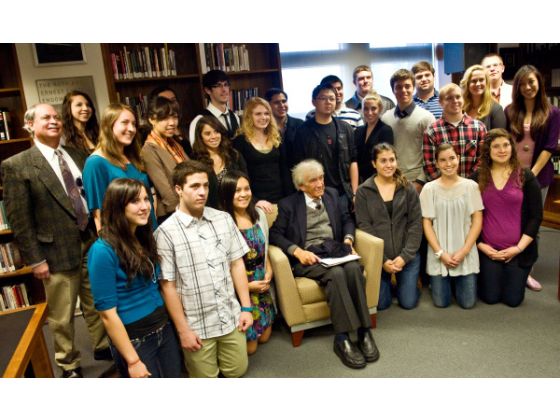 Above: Elie Wiesel looks frail in this group photo taken after he spoke to students at the Sala and Aron Samueli Holocaust Memorial Library at Chapman University. (Photo credit: Orange Country Register)
Above: Elie Wiesel looks frail in this group photo taken after he spoke to students at the Sala and Aron Samueli Holocaust Memorial Library at Chapman University. (Photo credit: Orange Country Register)
The Los Angeles Times sent its own reporter to cover the Holocaust Hero’s grand arrival at Chapman University during the first week of April. The Local section of the newspaper had a report on Wiesel’s visit with 21 students in the specialized Holocaust Library on the campus.
Wiesel has fewer answers these days (not much is expected of him) and speaks in a sort of cliché-language that he has mastered. He can be confident his listeners will supply a profound meaning to any utterance that comes forth from his mouth. For example:
One (student) wanted to know how Wiesel managed to overcome the memories of the deaths of his father, mother and sister to write his first book, “Night,” an autobiographical account of … Nazi concentration camps.
With deep sadness in his eyes, Wiesel replied, “Only those who were there know what it was like. We must bear witness. Silence is not an option.”
Wiesel did not really like this question and gave a short answer that was not an answer at all. The question was: How did he overcome the [painful] memories in order to write his book? His actual answer, interpreted, was: “I won’t, or I can’t, answer your question.” We can ask why he won’t answer that question, and also why he has not ever answered that question. Could it be because he has no idea how to answer it since such a thing did not actually happen to him?
To make it sound like he’s giving some kind of answer, he adds two things that have nothing to do with the question: “We must bear witness” and “Silence is not an option.” These are both favorite sayings typically associated with him. Upon hearing him say them, his listeners are satisfied that they are hearing the real Wiesel, that they are blessed by a “transforming” moment.
Another question was more to Wiesel’s liking. “How can this generation preserve what you learned there?”
Wiesel brightened as he said, “Listen to the survivors. They are an endangered species now. This is the last chance you have to listen to them. I believe with all my heart that whoever listens to a witness becomes a witness. Once we have heard, we must not stand idly by. Indifference to evil makes evil stronger.”
More platitudes. But a reader brought to my attention that Wiesel is contradicting something he said on another occasion. Even though we know contradictions are the usual fare from this man, it’s of note that in a 1978 interview with the New York Times, Wiesel pronounced:
“The Holocaust [is] the ultimate event, the ultimate mystery, never to be comprehended or transmitted. Only those who were there know what it was; the others will never know.”*
This fits his first answer, but not his second. So, is it that “only those who were there know what it was like” (meaning it’s impossible to transmit to others), or is it that we can all “become a witness” (and speak with authority about what it was like)?
If you really want the truthful answer, dear readers, it is whatever benefits the Holocaust Industry. That is the whole reason Elie Wiesel goes to Chapman University—to create publicity for Holocaustianity—since he adds no real value to the students’ learning. Still, it’s all taken very solemnly by the faculty, the mainstream media, and the impoverished students themselves, who don’t realize how they’re being cheated. In a university setting, they are expected to swallow whole whatever they hear from iconic sources re the holocaust. The real questions they have are not answered. It is a farce of education. This Presidential Fellowship shows us once again, when it comes to Elie Wiesel it is always “much ado about nothing.”
*Elie Wiesel, “Trivializing the Holocaust”, New York Times, 16 April 1978, p. 2:1 [Article written in response to the original airing of the NBC miniseries The Holocaust]; quoted in Peter Novick, The Holocaust in American Life, 1999, p. 211.
5 Comments
Category Featured | Tags: Tags: Chapman University, Distinguished Presidential Fellow, Elie Wiesel, Sala and Aron Samueli Holocaust Memorial Library,
Social Networks: Facebook, Twitter, Google Bookmarks, del.icio.us, StumbleUpon, Digg, Reddit, Posterous.
Wednesday, March 30th, 2011
by Carolyn Yeager
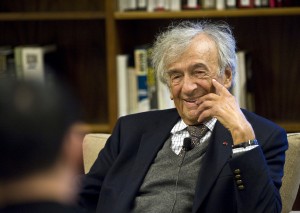 Elie Wiesel arrived at Chapman University in Orange CA on Monday, March 28 in his new capacity as “Distinguished Presidential Fellow” and gave a lecture titled “Knowledge and Ethics.” He also spoke to a small class of Chapman Religion students. According to the Orange County Register [photo at right courtesy Paul Bersbach, OCR], he “answered several questions, but posed many of his own.” This is typically the way Wiesel, 82, avoids revealing his ignorance of the entire topic of the concentration camps.
Elie Wiesel arrived at Chapman University in Orange CA on Monday, March 28 in his new capacity as “Distinguished Presidential Fellow” and gave a lecture titled “Knowledge and Ethics.” He also spoke to a small class of Chapman Religion students. According to the Orange County Register [photo at right courtesy Paul Bersbach, OCR], he “answered several questions, but posed many of his own.” This is typically the way Wiesel, 82, avoids revealing his ignorance of the entire topic of the concentration camps.
Wiesel’s contract with the university, and specifically with the Rodgers Center for Holocaust Education which is the real sponsor and driving force behind the contract, is for five years. Thanks to a bequest from Barry and Phyllis Rodgers, the Rodgers Center was opened in 2000 for the purpose of helping to keep the memory of the holocaust alive, well, and lucrative.
As we reported here last October, each spring semester Wiesel will deliver a lecture and carry on some interaction with students. Don’t think he’s doing it only in the interest of “keeping memory alive” or for any of the noble reasons suggested by Marilyn Harran, Director of the Rodgers Center and University spokesperson on matters pertaining to Wiesel’s fellowship.
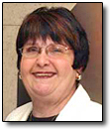
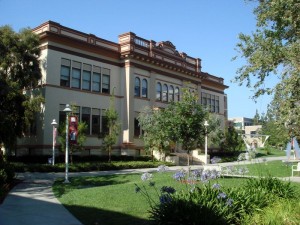
Left: Marilyn Harran. Right: Wilkinson Hall on the Chapman campus. The Rodger Center comes under the aegis of the Wilkinson College of Humanities and Social Studies.
As reported in the Chapman Panther newspaper on March 28, “Harran declined to say how much the Rodgers Center is paying Wiesel for his lecture. Mary Platt, director of communications and media relations, confirmed that the amount is confidential.”
It’s widely quoted that Wiesel’s standard speaking fee is $25,000. We don’t know how much he is charging for visiting with students in their classrooms, but it is no doubt substantial. Chapman’s wealthy Jewish donors who support activities at the special Rodgers Center for Holocaust Education and the Samueli Holocaust Memorial Library are apparently willing to pay it.
Harran, a professor in both the Religious Studies and History departments, is a devotee of Wiesel and his myth. She tends to speak of Wiesel in worshipful terms, as I reported in my Oct. 2010 blog post. At that time, she included these words in her announcement of his fellowship at Chapman: “We are unbelievably fortunate that he has chosen to return to Chapman and to share with us his knowledge and wisdom. I am stunned and deeply grateful that he will be with us in this new role as Distinguished Presidential Fellow. I know our university community will be profoundly enriched and inspired by his presence.” This is the cue for students to show the proper respect toward the visiting professor, and hang on his every word.
Harran is teaching a course this semester called “Elie Wiesel: His Life and Work” with Jan Osborn, professor of English. According to The Panther, only eighteen students are taking the course. Harran wrote a March 28th opinion piece for the school newspaper titled “Knowledge, ethics and Elie Wiesel” in which she mentioned his book Night and also said: “Some of you will recall seeing Wiesel visiting Auschwitz with Oprah Winfrey or standing by President Obama’s side at a commemorative ceremony in Buchenwald. These are powerful images. Indeed, it is hard to remember when the memory of the Holocaust did not have a place in our American life and culture. There are Holocaust documentaries and films; Holocaust museums in cities such as Chicago, Houston and Los Angeles, and the Sala and Aron Samueli Holocaust Memorial Library at Chapman. And there is the United States Holocaust Memorial Museum in Washington, D.C.”
Hurrah, hurrah. Isn’t it wonderful. She gives Wiesel much of the credit for bringing this about. She then asserts this historical tidbit: “the Final Solution was agreed upon in a 90-minute meeting attended by 15 senior SS officials and bureaucrats”—referring to the reputed “Wannsee Conference” in 1942 in Germany. But the meeting minutes show clearly that it was a discussion of the “final solution of the Jewish problem” as a deportation plan, not an extermination plan. So where does that leave Elie Wiesel’s story? And Harran is a PhD in History? It’s obvious she needs some help with knowledge and ethics herself.
Wiesel told the religion students that he studied literature at the Sorbonne University in France before he became a journalist for the Israeli paper Yediot Arhronot in Dec. 1949. I have shown in Questions on Elie Wiesel and the Sorbonne that that claim is false. Wiesel also told the students he cannot answer the questions: Why did the Holocaust happen? and Why did it happen to the Jews? But … “since I have survived, I feel I have a duty to do something with myself.”
In all their discussions of ethics, the pressing current persecution and torture of the Palestinians by Israel is never brought up. EWCTW will continue to report to you about Wiesel’s activities at Chapman. Contributions sent by readers are welcome.
* * *
Also see: Beyond Sensationalism: Writer Discusses Holocaust Literature. Ruth Franklin is on the book circuit trying to explain why holocaust memoirs are so full of fiction.
“From the very moment, it is imagination at work,” explained the writer. “There’s this myth that Holocaust texts emerged fully-formed from their creators. However, so much rewriting was done to tell the story in a more effective, memorable way.” Uh huh. sure.
2 Comments
Category Featured | Tags: Tags: Chapman University, Distinguished Presidential Fellow, Marilyn Harran, Rodgers Center for Holocaust Education, Ruth Franklin, Sorbonne,
Social Networks: Facebook, Twitter, Google Bookmarks, del.icio.us, StumbleUpon, Digg, Reddit, Posterous.
Friday, October 29th, 2010
by Carolyn Yeager
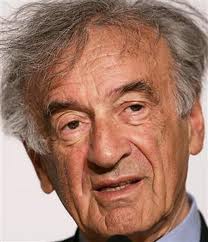
Elie Wiesel will “spend time” at Chapman University in Orange, California beginning this spring and for the following four years, through 2015, according to Chapman President Jim Doti. Wiesel has been appointed as a “Distinguished Presidential Fellow”, which means he will visit classes in Chapman’s Holocaust history minor, and possibly other disciplines, including history, French, religious studies and literature, according to chapmannews.
Chapmannews reports that complete plans for his fellowship activities are still in progress (as of August) and that he will retain his full-time faculty position at Boston University. As we have pointed out on this website, Wiesel’s duties at BU are light, leaving him time for his extra-curricular activities, now including being employed by a second university. However, Wiesel’s fellowship stay is also described as amounting to only “several days each spring.” My! “Visit” is certainly the right word for it.
“Distinguished Presidential Fellow” may be a newly invented position, meaning that he is appointed by the President (Jim Doti), not hired under academic requirements by a department dean. Wiesel will be what you might call, in diplomatic terms, an at-large representative of the Jewish interests that are no doubt paying his salary. He will be most closely associated with Chapman’s Rodgers Center for Holocaust Education, a unique construction that bridges the Religion and History Depts, and was opened in Feb. 2000 “through a generous gift from Barry and Phyllis Rodgers, [and] dedicated to preparing young people to become witnesses to the future.” Witnesses of the Holocaust? Is this the job of a university? Well, it seems to depend on who offers the money, and what they want it to be used for.
Wiesel offered special words of praise to Dr. Marilyn Harran, who directs the Rodgers Center for Holocaust Education, for “the way in which the university is teaching and remembering some of the most tragic events in human history, events that have had such a deep influence upon my life.” She and the Center are the reason that Wiesel says he “made the decision to return to Chapman annually as Distinguished Presidential Fellow.”
Dr. Harran is a professor of both history and religious studies at Chapman. She has even stronger words of praise for Wiesel, announcing, “[he] has been the face and voice of Holocaust memory and witness to the world, and an ambassador of humanity and hope for decades. He has consistently challenged us to learn from the Holocaust and to reject indifference, and – in his words – ‘to think higher and feel deeper.’ We are unbelievably fortunate that he has chosen to return to Chapman and to share with us his knowledge and wisdom. I am stunned and deeply grateful that he will be with us in this new role as Distinguished Presidential Fellow. I know our university community will be profoundly enriched and inspired by his presence.”
University President Doti is equally humbled by the presence of the great man, saying “That this remarkable individual, one of the world’s most famous and respected people, one who truly exemplifies the meaning of ‘global citizen,’ should choose to return to spend time with our students is truly a tremendous honor for Chapman.”
Does it seem from this that Wiesel will be under any kind of performance requirement at Chapman, or will he be the determiner of his own course of action? It is probably the same at Boston University – the tail is wagging the dog. But Wiesel’s presence at both universities is more a public relations benefit to the school than an educational benefit for students. His fame as a Holocaust icon, including his Nobel Peace Prize, make him a valuable commodity – as opposed to having any pretensions to scholastic stardom.
Chapman University is seeking to transition from a “teaching university” to a “research university.” That means the faculty will be required to “publish” in the field of their expertise, and the more you publish, the higher your pay. Not all faculty think this will be beneficial to the student experience at Chapman; there is a school of thought that values professors as mainly teachers rather than researchers. But others, probably more powerful, think it’s more important to “upgrade” Chapman into a higher-rated university.
Emphasis on the Holocaust
Elie Wiesel’s visiting fellowship may be in accord with those objectives. The Sala and Aron Samueli Holocaust Memorial Library opened in April 2005, dedicated to providing a space “where teachers and students may gather to learn from survivors, visual testimonies and printed resources.” At the entrance to this library is a large bronze bust of – guess who? Elie Wiesel! 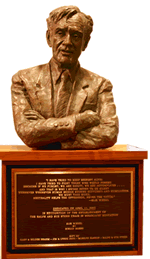 The library has an exhibit area that currently displays “Themes of the Holocaust” featuring photos and artifacts donated or lent by individuals and institutions. Group tours are also arranged. It’s like a little Holocaust museum right there on the university grounds.
The library has an exhibit area that currently displays “Themes of the Holocaust” featuring photos and artifacts donated or lent by individuals and institutions. Group tours are also arranged. It’s like a little Holocaust museum right there on the university grounds.
At Chapman, the Holocaust is taught in both the Religion and History Depts., and several of the courses overlap both. It is really quite amazing how much of the History curriculum is devoted to this subject. That Holocaust is taught in the Religion Department—as it is at Boston University—makes sense because it is a belief. It has become an unquestioned, highly enforced belief system that is assumed to be true at its base, but with too little examination of the basic operations it would require.
A difference in approach at Chapman however, as compared to BU, is the emphasis on Holocaust in the History Dept. I discovered six courses containing Holocaust, five of them devoted exclusively to it. This is a lot for a small university like Chapman, perhaps more than at any other accredited university in the United States. The History Dept. offers on an every-year basis:
HIST 307 Germany and the Holocaust
(Same as REL 307.) This course examines the Holocaust within the context of the history of World War II. Topics include the origins of the Holocaust, the implementation of the Final Solution, resistance to the Nazis, survivor experiences, and the legacy of the Holocaust. (Offered every year.) 3 credits. Also offered in Religion
HIST 365 Topics in the Holocaust
(Same as REL 365.) This course examines selected topics within the study of Holocaust history, such as the roles of doctors, theologians and religion under Hitler, the persecution of non–Jewish groups (including homosexuals and gypsies), and the experiences and choices of perpetrators, victims, and bystanders. Courses that treat different themes may be repeated for credit. (Offered every year.) 3 credits. Also offered in Religion
HIST 365a Perpetrators, Witnesses, and Rescuers
[Same as REL365a] Within the context of Nazi Germany, World War II and the Holocaust, this course examines the choices that individuals faced and the decisions that defined them as perpetrators or rescuers. Includes the stories of those who survived the Holocaust to become witnesses to the truth. (Offered every year.) 3 credits. Also offered in Religion
Offered every other year, Spring semester:
HIST 365b The Holocaust: Memoirs and Histories
This course explores the complex history of the Holocaust from the perspective of selected memoirs written by survivors and examines the contributions and limitations of memoirs in shaping the historical record. (Offered spring semester, alternate years.) 3 credits.
The following two courses are offered “as needed:”
HIST 356 Modern Germany: From Sarajevo to Stalingrad
This course examines the political, social, and intellectual history of Germany from World War I to the end of World War II. Topics include the Holocaust and the roles of individuals in taking Germany down the path to two world wars. (Offered as needed.) 3 credits.
HIST 297 The Holocaust in History and Film
An introduction to the history of the Holocaust, from initial persecution to the implementation of the Final Solution, including the actions of perpetrators, rescuers, and resisters; the dilemmas facing those targeted for persecution, and major issues in the interpretation and visual representation of the Holocaust. (Offered as needed) 3 credits.
* * *
The Religion Dept. at Chapman offers three courses every year that are also offered in History:
REL 365 Topics in the Holocaust
(Same as HIST 365.)
REL 365a Perpetrators, Witnesses, and Rescuers
(Same as HIST 365A.)
REL 307 Germany and the Holocaust
(Same as HIST 307.)
In addition to all of this, there is the extensive program offerings of the Rodgers Center for Holocaust Education, which is entirely funded by several Jewish groups outside the university. According to the Chapman website, the mission of the Rodgers Center is to increase knowledge of the Holocaust, further discussion of the causes of genocide, and encourage reflection on the contemporary relevance of the Holocaust to our lives today.
As part of its mission, the Center sponsors a Lecture Series each year. For example, on Sept. 21 James Young gave a lecture entitled “Stages of Memory: Challenges of Memorialization (sic) from the Holocaust to the World Trade Center.” Young is Professor of English and Judaic Studies at the U of Mass, Amherst. He has written two books about the Holocaust: one about Holocaust Memorials and one about Holocaust Architecture. [Isn’t Holocaust to the World Trade Center quite a stretch? -cy]
The Art and Writing Contest is an annual program that involves “thousands of Southern California middle and high school teachers and students, culminating in an awards ceremony on campus.
Beginning in 2000, the Rodgers Center began a yearly Evening of Holocaust Commemoration to create a “community of witnesses” for the Chapman area.
What more can they think up?!
No one can deny that Holocaust is alive and well at Chapman University. And now Elie Wiesel, the “Grand Poobah” himself, will arrive every spring to energize it even further, and bring lots of media attention in his wake. This is a public relations dream!
But for those of us who care about the truth, it’s more like a nightmare. What do you think, dear reader?
4 Comments
Category Featured | Tags: Tags: Chapman University, Distinguished Presidential Fellow, Marilyn Harran, Rodgers Center for Holocaust Education, Sala and Aron Samueli Holocaust Memorial Library,
Social Networks: Facebook, Twitter, Google Bookmarks, del.icio.us, StumbleUpon, Digg, Reddit, Posterous.
 Elie Wiesel did not have a visit with Chapman University students this spring. Up until this year, he had completed only two years of his five-year appointment as a Distinguished Presidential Fellow at the university. 2013 would have been year three. Wiesel previously arrived at the end of March or in April for about five days. Now it is already June and school is out.
Elie Wiesel did not have a visit with Chapman University students this spring. Up until this year, he had completed only two years of his five-year appointment as a Distinguished Presidential Fellow at the university. 2013 would have been year three. Wiesel previously arrived at the end of March or in April for about five days. Now it is already June and school is out.






